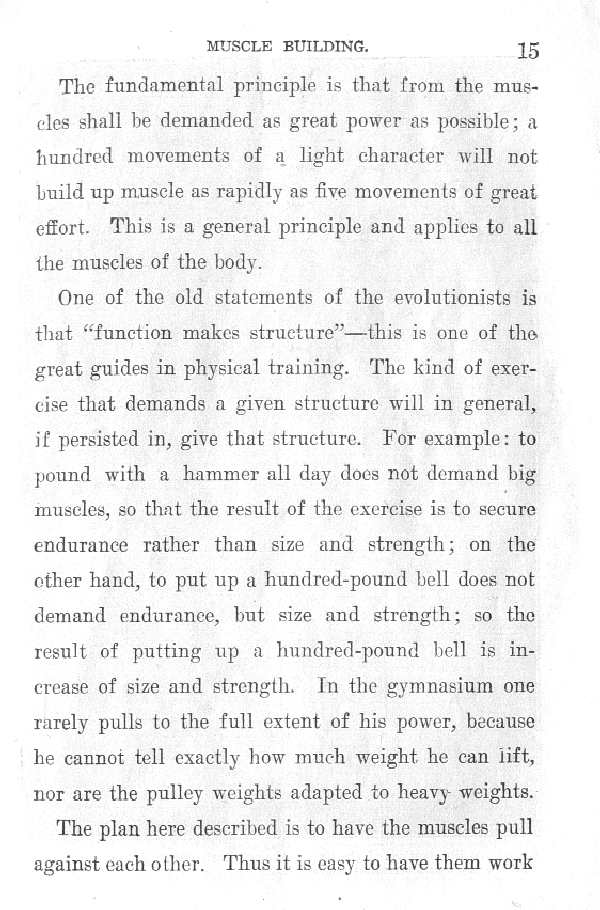mb 15

MTJSCLE BUIŁDING. pg
The fundamental principle is tliat froni the muę-eles shall be demanded as great power as possible; a hundred movements of a light charaeter will not build up musele as rapidly as five movements of great effort- This is a generał principle and applics to all the muscles of the body.
One of tho old statoments of the evolutionists is that "function makcs struci u rc'"—this is one of tho great guides in physical training. The kind of exer-eise tliat demands ą given structurc will in generał, jf persisted in, give tliat strneture. For example: to ponnd with a hammer all day doos not doinand big muscles, so tliat the resnlt of the cxercise is to secure enduranee rather than size and strength; on the other hand, to put up a hundrod-pound beli does not demami enduranee, but size and strength; so tho resnlt of putting up a hundred-ponnd beli is in-crease of size and strength. In the gymnasium one rarely pulls to tlie fuli oxient of his power, because be cannot tell exactly ho w muc-h weight hc can iift, nor are the pulley weights adapted to heavy wcights.
The plan here described is to have the muscles puli against each olher. Thus it is casy to have them work
Wyszukiwarka
Podobne podstrony:
mb 21 MtJSCLE BUILDING. 21 esercise should not be long in duration. The muscles ei
mb 41 MUSCLE BUILDINC. Ą łax the ill of most men; it is sliort onoiigli to be wit
mb 25 MUSCLE BUILDING. 25 lf this esercise is tried in front of a looking-glass on
5) in Artide 10, the following paragraph shall be added: ‘6. Paragraphs 1 to 4 sha
2) in Article 57(1), the following point shall be added: (t) taking decisions as referred to in Art
• Anicie 21MmJ/kt 1. The Fcderal (lag shall be tcspeaed in Eriuea. Flag, scal and arms of Eriuea «L
kryzys bułgarski (2) CHAPTRR 9 ir»uli front an orntual dissolution of the Ottoman Empire shall be re
League of Nałions — Treaty Series. + Article 10. The common policy of the Permanent Council shall be
42 United Nations — Treaty Series1972 Section 2.04. The Closing Datę shall be December 31,1974 or su
więcej podobnych podstron